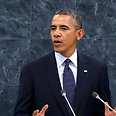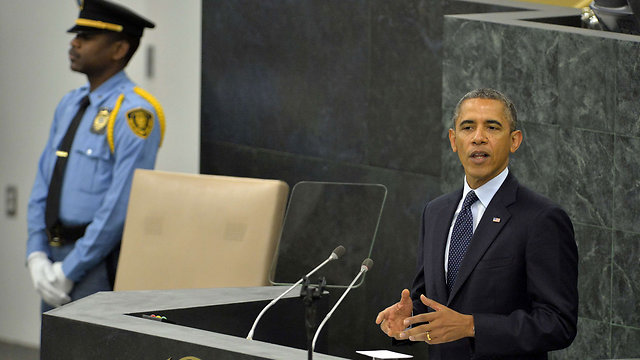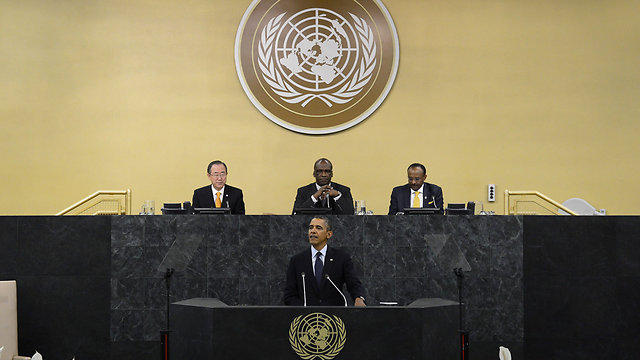
Obama: Israel security depends on Palestinian state
US president notes Washington seeks diplomatic solutions in Syria, Iran, but is prepared to use all elements, including military force, to secure US interests in Mideast. Stresses will never compromise commitment to Israel
US President Barack Obama addressed the UN General Assembly on Tuesday, discussing economic and diplomatic issues in the world.
In referring to conflicts around the world, including recent events in Kenya, Syria, Egypt and Pakistan, Obama noted that Israel's security was dependent on the existence of a Palestinian state.
Related stories:
- Iran to join six-power talks at UN this week
- Israelis to boycott Rohani's UN address
- US, Iran: Decades of complex, troubled relations
He added that his country is determined to resolve the Israeli-Palestinian conflict, that there is a consensus within Israel that the occupation harms Israeli interests, and that Americans are committed to both the Israeli interests and to the idea that the Palestinians deserve their own state.
Obama stated that Palestinian President Mahmoud Abbas agreed to return to the negotiations table and that Prime Minister Benjamin Netanyahu agreed to release prisoners, and now borders and other issues are being discussed.
Referencing wider conflicts around the world, Obama said of Syria: "Nowhere have we seen these trends more powerfully than in Syria," discussing the fact the international community must enforce the ban on chemical weapon.
He further noted that the global consensus against the use of chemical weapons had been strengthened by memories of "soldiers suffering in trenches, Jews slaughtered in gas chambers, Iranians poisoned in the many tens of thousands."

Obama: UN must ensure Syria is chem free (Photo: AFP)
The US president nonetheless stated he preferred a diplomatic solution to the crisis in Syria, saying the "UN Security Council must approve strong resolution to ensure Syria is keeping chemical weapons commitments."
Obama reiterated his demand that Syrian President Bashar Assad cannot continue to lead Syria, but said he would not use US military force to depose him.
"That is for the Syrian people to decide," he said. "Nevertheless, a leader who slaughtered his citizens and gassed children to death cannot regain the legitimacy to lead a badly fractured country."

Obama at UN's General Assembly (Photo: AFP)
Obama called on Assad allies to stop supporting his regime.
"The notion that Syria can somehow return to a pre-war status quo is a fantasy," he said. "It's time for Russia and Iran to realize that insisting on Assad's role will lead directly to the outcome that they fear: an increasingly violent space for extremists to operate."
As for the issue of Iran's nuclear program, Obama stressed the "US wants to resolve the Iranian nuclear issue peacefully but is determined to prevent Iran nuclear weapon."
Insisting that Washington was not seeking regime change in Iran, he noted "there should be basis for agreement on Iran nuclear program based on recent statements from Iran leadership, directs Secretary (of State John) Kerry to pursue a deal.
"The roadblocks may prove to be too great but I firmly believe the diplomatic path must be tested," Obama said.
It remained unclear whether Obama would have a direct encounter with Iranian President Hassan Rohani while both are in New York on Tuesday. White House officials say Obama is open to such an encounter under the right conditions.
The United States and its allies have for years applied pressure on Iran to give up its nuclear ambitions. Tehran denies trying to build a weapon and insists its nuclear program is for civilian purposes only.
But a US-Russian agreement this month aimed at getting control of Syrian chemical weapons after an Aug. 21 poison gas attack in Syria has added momentum to efforts to engage Iran.
Obama and Rohani exchanged letters recently in which each expressed a willingness to find a diplomatic outcome.
The White House official said Obama's speech will also focus on ongoing efforts to achieve a political resolution to the civil war in Syria.
In addition, he will discuss the resurgence in diplomatic activity aimed at bringing Israelis and Palestinians together as the two parties take part in direct negotiations.
Earlier Tuesday, UN Secretary-General Ban Ki-moon addressed the General Assembly, urging world leaders to stop fueling the bloodshed in Syria with weapons and get both sides to the negotiating table to end the "biggest challenge to peace and security in the world."
In his annual state of the world address to presidents, prime ministers and monarchs at the UN General Assembly on Tuesday, the UN chief said the response to last month's "heinous use of chemical weapons" outside Damascus "has created diplomatic momentum – the first signs of unity in far too long."
He called on the UN Security Council to adopt an "enforceable" resolution on a US-Russian agreement to put Syria's chemical weapons under international control. He also urged punishment for the perpetrators of last month's chemical weapons attack, possibly at the International Criminal Court.
Reuters, AP contributed to this report
- Receive Ynetnews updates directly to your desktop











